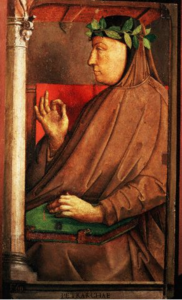Sonnet
(Poet's title: Sonett)
Set by Schubert:
D 630
[December 1818]
Nunmehr da Himmel, Erde schweigt und Winde,
Gefieder, Wild, des Schlummers Bande tragen,
Die Nacht im Kreise führt den Sternenwagen,
Und still das Meer sich senkt in seine Gründe:
Nun wach’ ich, nun sinn ich, glüh und wein und finde
Nur sie, die mich verfolgt mit süßen Plagen.
Krieg ist mein Zustand, Zorn und Missbehagen,
Nur, denk ich sie, winkt Friede mir gelinde.
So strömt, was mich ernährt, das Süß’ und Herbe,
Aus eines einz’gen Quells lebend’gem Strahle,
Dieselbe Hand gibt Heilung mir und Wunden.
Und dass mein Leiden nie ein Ziel erreiche,
Sterb und ersteh ich täglich tausendmale,
So weit entfernt noch bin ich, zu gesunden.
Now that the sky, the earth and the winds are silent,
The birds of the air and beasts of the forest are bound up in sleep,
Night is leading the chariot of the stars around in a circle
And the sea is quietly settling down into its bed:
Now I am awake, I think, I burn and weep and find
Only her, she who pursues me with sweet torments.
War is my state, rage and unease;
However, if I think of her, peace gestures towards me in a gentle way.
Thus it flows, that which nourishes me, both sweet and bitter,
From the living stream of a single source;
The same hand gives me both healing and wounds.
And so that my suffering will never reach an end,
I die and am resurrected a thousand times a day;
So far am I still from being healed.
All translations into English that appear on this website, unless otherwise stated, are by Malcolm Wren. You are free to use them on condition that you acknowledge Malcolm Wren as the translator and schubertsong.uk as the source. Unless otherwise stated, the comments and essays that appear after the texts and translations are by Malcolm Wren and are © Copyright.
☙
Themes and images in this text:
Anger and other strong emotions Birds Bitterness Carts and chariots Circles The earth Food, feeding and nursing Hands Heaven, the sky Knots and bonds Near and far Night and the moon Noise and silence Pain Resurrection The sea Sleep Springs, sources and fountains Stars Sweetness Tears and crying War, battles and fighting Wind
Or che ‘l ciel e la terra e ‘l vento tace,
E le fere e gli augelli il sonno affrena,
Notte il carro stellato in giro mena
E nel suo letto il mar senz’onda giace;
Vegghio, penso, ardo, piango; e chi mi sface
Sempre m’è inanzi per mia dolce pena:
Guerra è il mio stato, d’ira et di duol piena;
E sol di lei pensando ho qualche pace.
Così sol d’una chiara fonte viva
Move ‘l dolce e l’amaro ond’io mi pasco;
Una man sola mi risana e punge.
E perchè ‘l mio martìr non giunga a riva,
Mille volte il dì moro e mille nasco;
Tanto da la salute mia son lunge!
Petrarca, Rime In vita di Madonna Laura, 164
Now that the sky and the earth and the wind are silent
and the wild creatures and the birds are reined in sleep,
Night leads its starry chariot in its round,
and the sea without a wave lies in its bed,
I look, think, burn, weep: and she who destroys me
is always before my eyes to my sweet distress:
war is my state, filled with grief and anger,
and only in thinking of her do I find peace.
So from one pure living fountain
flow the sweet and bitter which I drink:
one hand alone heals me and pierces me:
and so that my ordeal may not reach haven,
I am born and die a thousand times a day,
I am so far from my salvation.
English translation from Italian © A. S. Kline 2002
Petrarch’s use of oxymoron is not just a poetic conceit. He presents it as a straightforward fact that Laura pursues him with ‘sweet torments’. What she offers is both sweet and bitter, wound and cure, life and death. This state of tension or contradiction is what he calls a state of war or unease, in contrast with the calm and silence experienced by the outside world at night.
The first four lines of the octet present the external world as an objective, calm reality. In line one, inanimate nature (heaven, earth, the atmosphere) says nothing. There is a sense of a deliberate refusal to speak in the German verb ‘schweigen’ (translating the similar Italian ‘tacere’) which cannot quite be captured in English. Line two is about animate nature, in the air and on the ground, where the birds and the beasts are now caught up in the bands of sleep. The stars in the sky (line 3) seem to revolve and the sea (line 4) settles down. There seems to be nothing to disturb this teeming, massive outer environment.
How different things are within. In the second half of the octet it is all about ‘me’: ich, mich, mein, mir (I, me, my, to me). The poet’s turmoil is caused by ‘her’, she who both puts him in a state of war and gestures nothing but peace when he thinks about her. Here there can be no sleeping, no silence. There is fury and unease, but also ‘sweet’ torment.
After the volta the focus is on the speaker’s health. Laura is presented as a nurse who provides sweet and bitter nutrition. She inflicts wounds and offers healing. This latter concept involves religious overtones, too, since ‘Heilung’ can refer equally to spiritual ‘salvation’ or to physical health. Petrarch’s original plays on the same ambiguity (‘la salute’ = salvation / health).
☙
Original Spelling and note on the text Sonett. XVIII. Nunmehr da Himmel, Erde schweigt und Winde, Gefieder, Wild, des Schlummers Bande tragen, Die Nacht im Kreise führt den Sternenwagen, Und still das Meer sich senkt in seine Gründe: Nun wach' ich, nun sinn' ich, glüh und wein, und finde Nur sie, die mich verfolgt mit süßen Plagen. Krieg ist mein Zustand, Zorn und Mißbehagen; Nur, denk' ich sie, winkt Friede mir gelinde. So strömt, was mich ernährt, das Süß' und Herbe, Aus eines einz'gen Quell's lebend'gem Strahle; Dieselbe Hand gibt Heilung mir und Wunden. Und daß mein Leiden nie ein Ziel erreiche1, Sterb' und ersteh' ich täglich tausend Male; So weit entfernt noch bin ich zu gesunden. 1 Schubert changed Gries's 'erwerbe' (acquire) to 'erreiche' (reach)
Confirmed by Peter Rastl with Francesco Petrarca, Il Canzoniere con le note di Giuseppe Rigutini, rifuse e di molto accresciute da Michele Scherillo. Terza edizione, rinnovata. Ulrico Hoepli, editore libraio della real casa, Milano, 1918, page 319; and with Le Rime di Francesco Petrarca secondo la revisione ultima del poeta a cura di Giuseppe Salvo Cozzo. In Firenze, G. C. Sansoni, editore. 1904, page 172.
Confirmed by Peter Rastl with Schubert’s source, Blumensträusse italiänischer, spanischer und portugiesischer Poesie von August Wilhelm Schlegel. Berlin. In der Realschulbuchhandlung. 1804, page 51. The name “Gries” appears beneath the translation.
Note: Schlegel included in his Blumensträusse, along with his own translations, four translations of Petrarca’s sonnets by Johann Diederich Gries. These were republished, in revised versions, in Gedichte und poetische Übersetzungen von J. D. Gries, Stuttgart, 1829.
To see an early edition of the text, go to page 51 [63 von 268] here: http://digital.onb.ac.at/OnbViewer/viewer.faces?doc=ABO_%2BZ167383408



